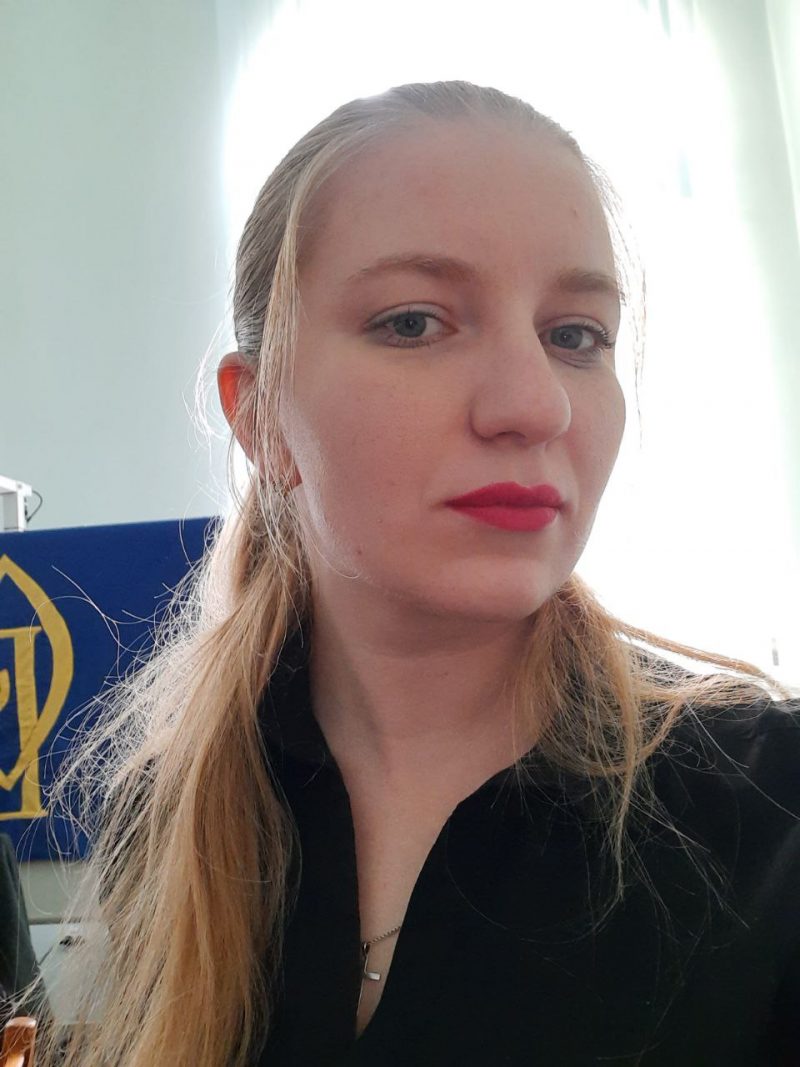Maria Kisil is a project manager at YMCA Lviv and the “evil woman”, as she says about herself 
In addition, Maria has been engaged in social activities for more than 10 years, has passed the Revolution of Dignity and, like all members of our team, is a military volunteer.
Maria has begun actively volunteering on the 24th of February and continues this work until now.
Moreover, knowing how volunteers live and work (a huge number of volunteers work for a long time to the point of exhaustion without payment), she has leaded a project to support volunteers.
To the question “was she ready for the beginning of the war?” she answers “Yes and no.” Maria was sure that the war would start. She and her husband packed an alarm suitcase and had a ready-made basic plan: when the war begins, they go to the village, assess the situation from there and decide how to act. When they heard about the beginning of the war, there was no fear – she got scared later.
“First you act, and then you are afraid. When you have a plan, there is no time to be “afraid”.
They really spent the first day of the war in the village. But they joined the work remotely – till 9 in the morning they have already called their friends, organized the headquarters and started working on the information front: they were collecting and analyzing information; wrote notes about what was happening in the country and sent them to friends abroad. At the same time, they began to organize the supply of necessary things to people fleeing from hostilities: at that time, these were sleeping bags, food, and hygiene products. Everyone understood that Lviv, as a rear city, would be overcrowded. Maria’s husband began to engage in cyber warfare.
Thus passed the first day of the war.
The family returned to Lviv on the second day. The husband went to patrol the city, and Maria went to Poland to get SUVs for the Ukrainian army. It was the night when street fighting began in Kyiv and the cars were supposed to go there.
Nowadays, this story even makes you smile – both, volunteers and border guards understood that these vehicles were critically important for the defense of the country, but at that time none of them knew how to transport them to Ukraine correctly and quickly.
At 5 in the morning at the border, the following dialogue took place between Maria and the border guard:
– Listen, I don’t know what to do with you. I would let you go now without additional papers, but if the car gets into an accident somewhere, then I will have huge problems.
– These cars are now on their way to Kyiv. The chances that they will get into an accident are minimal. Chances that they will not burn in the battles in Kyiv – too.
The customs officer thought for five seconds, after which the girls with the cars were immediately let through. This situation was remembered as a moment of absolute mutual understanding and readiness to take responsibility for the decisions made.
Later, Maria began systematically providing humanitarian aid: both civilian and military. It was necessary to navigate according to the circumstances – the actual requests changed every day. “Military” needs were quickly added to the “humanitarian” needs: thermal imagers, drones, scopes… Maria began collecting funds for them on her Facebook page.
Tablets were one of the first such shipments to the military. A week later, Maria received a photo of a burnt piece of metal. At first, she did not understand what it was – it was explained to her that it was all that was left of one of the tablets. Maria understood that the tablet was in the hands of a military man. And if the device burned like that, what was left of the person? Gathering her spirits, she asked about the fate of the boys.
She was told that the boys miraculously survived.
– I had the feeling then that it was Christmas, Easter and my birthday at the same time. And immediately after that – such a feeling of guilt because you need to do much more!
In general, a volunteer is a kind of tangle of emotions of guilt and responsibility. We often do not allow ourselves to relax, rest, show weakness. And you also feel responsible, not only, for handing over what is necessary to the military. You feel responsible for the morale and condition of the people: you want to support those who protect and inspire those who help in the rear. That is why volunteers’ Facebook posts are frequently joyful, with jokes and kitties. Nerves, tears, despair and an enormous layer of invisible work remain behind the scenes.
– What is volunteering for you?
– Volunteering is a story about love. At some moments, I thought that I was doing it for selfish reasons: because I want to win, or I want to feel useful… But volunteering is a tremendous sacrifice, and sacrifice is possible only through love. You just see a person in a Ukrainian pixel – and you already love him. Everyone – those whom you do not know, those whom you will never see – you love with all your heart everyone who stands for you on this front.


